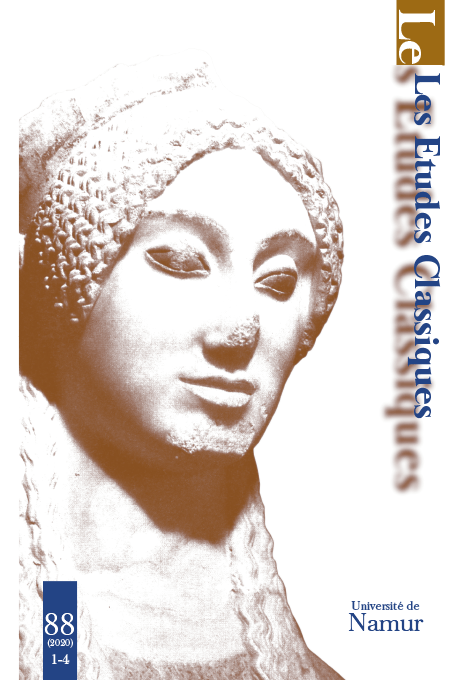 previous article in this issue previous article in this issue | next article in this issue  |

Preview first page |
Document Details : Title: Claude de Mesmes d'Avaux und Jacobus Balde S.J. Subtitle: Eine Lateinerfreundschaft im Schatten des Dreißigjährigen Kriegs Author(s): STROH, Wilfried Journal: Les Études Classiques Volume: 85 Issue: 1-4 Date: 2017 Pages: 219-266 DOI: 10.2143/LEC.85.1.3290508 Abstract : Jacobus Balde SJ (1604-1668), who, thanks to the international medium of Latin, was the most famous poet of Germany, had many friends abroad. Most prominent among them was Claude de Mesmes d’Avaux (1595-1650), chief ambassador of Louis XIV, who represented France at the Münster negotiations which led to the Peace of Westphalia. Being a homo humanissimus and an excellent Latinist, d’Avaux really fell in love with the ingenious verses of the Bavarian poet, who, on his part, used his poems to strongly remind d’Avaux of his duty to establish a lasting peace for long-suffering Germany. So he wrote a whole book of lyrical odes under the title Memmiana (1646), and a strange comedy, composed in archaic Latin, Drama georgicum (1647), to celebrate the armistice of Ulm, which for half a year provided some breathing space. The Elogium Memmianum, written in 1650, after the immature death of d’Avaux, and published in 1660, testifies to Balde’s love for his friend and admiration for a bringer of peace. He admitted, however, in his Crisis (composed in 1657, published posthumously in 1729), that there were in his lifetime some invidious people who attributed selfish motives to Balde. Similar suspicions and hypotheses are voiced even now. Grâce à la langue internationale qu’était le latin, le jésuite Jacob Balde (1604-1668), le plus célèbre poète d’Allemagne de son temps, eut de nombreux amis à l’étranger. Le plus important d’entre eux fut Claude de Mesmes d’Avaux (1595-1650), premier ambassadeur de Louis XIV, qui représenta la France lors des négociations de Münster qui menèrent à la paix de Westphalie. Homo humanissimus et excellent latiniste, il tomba littéralement amoureux des vers ingénieux du poète bavarois, qui pour sa part s’efforça, par ses poèmes, d’impliquer d’Avaux en faveur de la paix que les souffrances de l’Allemagne réclamaient urgemment. Il écrivit donc un livre entier d’odes lyriques intitulé Memmiana (1646) et une étrange comédie composée en latin archaïque, le Drama georgicum (1647), pour célébrer l’armistice d’Ulm qui offrit une demi-année d’accalmie. L’Elogium Memmianum, composé après la mort prématurée de d’Avaux (en 1650, publication en 1660) atteste l’affection de Balde pour un véritable ami et son admiration pour un artisan de la paix. Il n’ignore toutefois pas (dans la Crisis, datée de 1657 et publiée à titre posthume en 1729) qu’il y avait de son vivant des esprits chagrins qui attribuaient à Balde des motivations intéressées. Des suspicions et des hypothèses de ce genre sont en vogue encore aujourd’hui. |
 |


